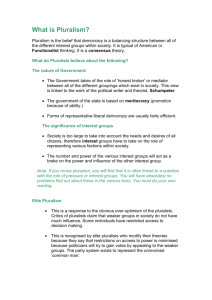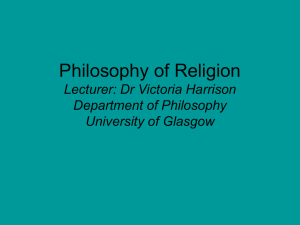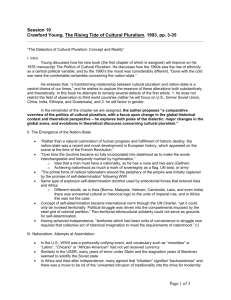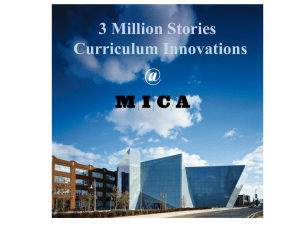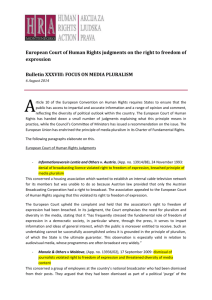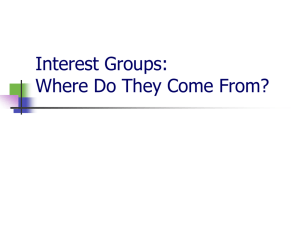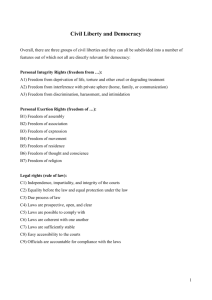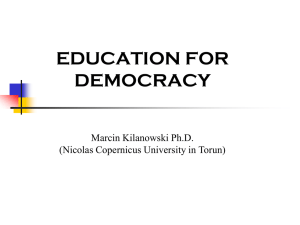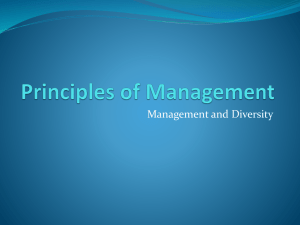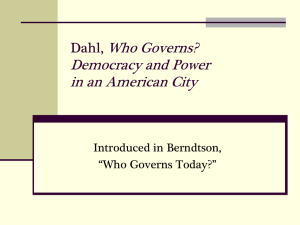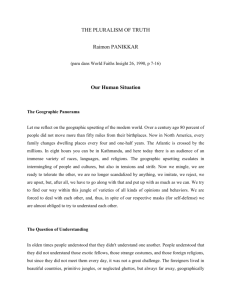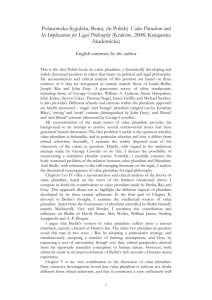Laudatory speech for prof.dr. Amartya Sen, Conferring
advertisement
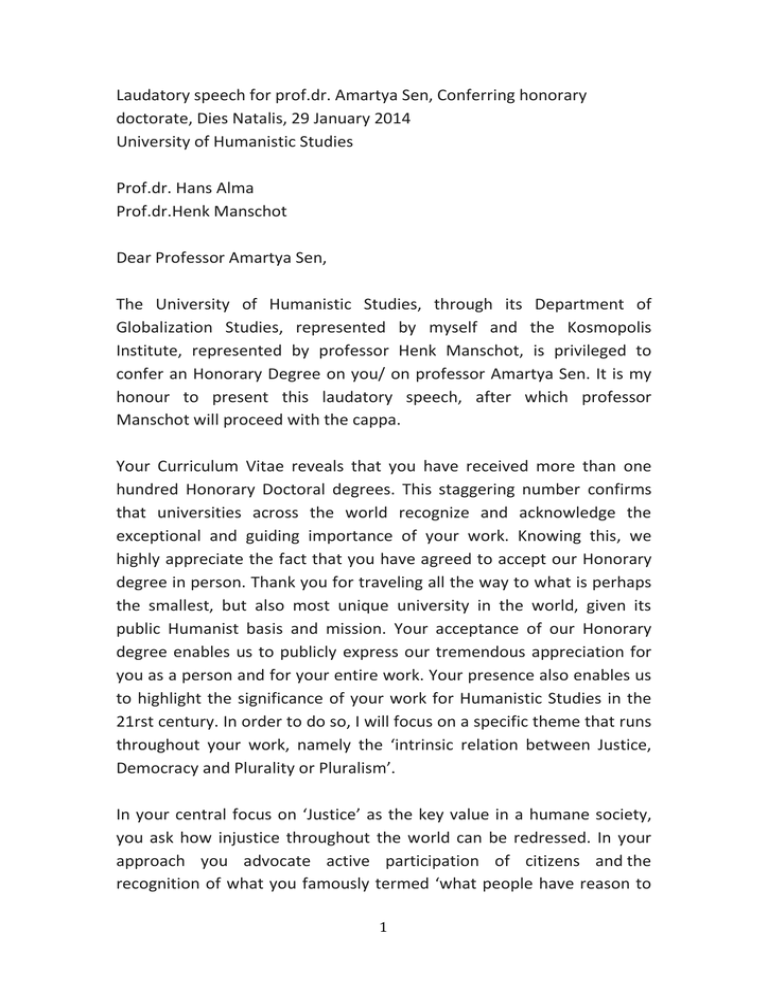
Laudatory speech for prof.dr. Amartya Sen, Conferring honorary doctorate, Dies Natalis, 29 January 2014 University of Humanistic Studies Prof.dr. Hans Alma Prof.dr.Henk Manschot Dear Professor Amartya Sen, The University of Humanistic Studies, through its Department of Globalization Studies, represented by myself and the Kosmopolis Institute, represented by professor Henk Manschot, is privileged to confer an Honorary Degree on you/ on professor Amartya Sen. It is my honour to present this laudatory speech, after which professor Manschot will proceed with the cappa. Your Curriculum Vitae reveals that you have received more than one hundred Honorary Doctoral degrees. This staggering number confirms that universities across the world recognize and acknowledge the exceptional and guiding importance of your work. Knowing this, we highly appreciate the fact that you have agreed to accept our Honorary degree in person. Thank you for traveling all the way to what is perhaps the smallest, but also most unique university in the world, given its public Humanist basis and mission. Your acceptance of our Honorary degree enables us to publicly express our tremendous appreciation for you as a person and for your entire work. Your presence also enables us to highlight the significance of your work for Humanistic Studies in the 21rst century. In order to do so, I will focus on a specific theme that runs throughout your work, namely the ‘intrinsic relation between Justice, Democracy and Plurality or Pluralism’. In your central focus on ‘Justice’ as the key value in a humane society, you ask how injustice throughout the world can be redressed. In your approach you advocate active participation of citizens and the recognition of what you famously termed ‘what people have reason to 1 value’. Characteristically, your idea of justice is grounded in a basic trust in human beings and their preparedness to reason, even in difficult and conflictual circumstances. This presupposes an innate relationship between the search for justice and the search for democracy. For you, democracy requires a solid process of public reasoning, and governance through deliberative practices. Your approach starts from the actual lives and freedoms of people, whereby norms, laws and institutions play an important role, but where the main focus is on honoring and promoting ‘active citizenship and public reasoning’ as the road towards a more just society. Here you also express your appreciation for the work of local and global civil society organizations and activists. For Humanism and Humanistic Studies in the 21rst century, your focus on the intrinsic connection between Justice and Democracy is of vital importance. Humanism as a worldview and Humanistic Studies as an academic multidiscipline both share your dedication to the development of just societies where all people can live meaningful lives. Your insistence that justice can be promoted through participatory processes rooted in actual circumstances, teaches us that Humanism and Humanistic Studies are optimistic but realistic endeavors, which are worth pursuing. While the notion of Democracy expresses political dimensions of public reasoning and public participation, your ideas about pluralism and plurality articulate its cultural dimensions. Throughout your work, you emphasize the central value of cultural diversity and the diversity of moral and spiritual traditions when we deliberate on a global idea of Justice. Explicitly, you encourage the contemporary heirs of the European Enlightenment to broaden their horizon and study what other cultural traditions foreground in terms of values and commitments. Across the world, key values and traditions of democracy, freedom and justice are grounded in long, diverse and rich histories which are no less meaningful than those expressed within the traditions of the European Enlightenment. It is a pleasure to read how you keep finding subtle, 2 ironic and humorous ways to remind us of the breadth and depth of other cultures as a way to address western arrogance. But your plea for pluralism and plurality goes further. You show us that even after ‘giving serious consideration to distínct and cóntrary arguments and analysis, coming from different quarters’, it is still possible to disagree about what justice entails. There are differences that cannot be eradicated by a greater universal ideal of justice. This is why you opt for a strong comparative empirical approach. At the University of Humanistic Studies we appreciate how you seek to connect cultural pluralism and justice in both local and global contexts, within your open and affectively rich concept of public reasoning. In your book Identity and Violence, you focus on identity and cultural pluralism. Here you warn us against “the insistence on a choice-less singularity of human identity” which in your own words “not only dismisses us all, but also makes the world much more flammable”. In Humanistic Studies, we highly value your idea that “the main hope of harmony in our troubled world lies in the plurality of our identities”. For the last ten years, together with the Humanist Institute for Cooperation with Developing Countries (Hivos), we have conducted a month-long intensive annual summer school with groups of graduate students, NGO staff and activists from Uganda, South Africa, India, Indonesia and the Netherlands. In this school, we not only focus on academic literature, but also live together and thus experience the richness but also the difficult challenges of plurality in a context of shared human dignity. Your work on plurality and pluralism and your appeal to value diversity inspires us both in our teaching and in our research programs, particularly in our research group on globalization and pluralism. Here we don't use pluralism in a neutral sense. We believe that pluralism entails more than tolerance and differs from relativism, because it involves an active search for understanding that transcends boundaries of differences, without denying the value of these differences. In the 3 years to come, we hope to develop our research program on pluralism in ways that do justice to the powerful, important and inspiring contribution you give to this field. 4
